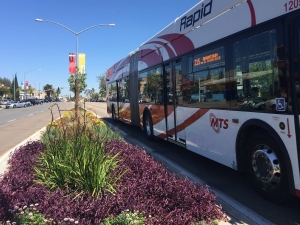
By Miriam Raftery
July 15, 2017 (San Diego) – California’s Supreme Court has ruled 6 to 1 in favor of the San Diego Association of Governments, finding that an environmental impact study for the 2050 Regional Transportation Plan is legal and complied with state law on climate change concerns. The ruling overturned only the greenhouse gas study challenge, but upheld a decision by an appellate court that ruled against SANDAG on other issues.
Environmental groups including Sierra Club, Cleveland National Forest Foundation, and the Center for Biological Diversity had filed suit asserting that the study did not go far enough, and did not comply with a Governor’s executive order aimed at reducing greenhouse gas emissions that contribute to climate change.
SANDAG Chairman and county Supervisor Ron Roberts stated after the verdict, “The Court clarified today that our responsibility is to state law, and that SANDAG appropriately followed that law.” He added that lower court decisions had left local governments struggling to determine which standard to meet.
“We disagree with the court’s narrow ruling, but this decision will clearly push transportation planners to better evaluate the massive greenhouse pollution generated by decades of sprawl development and neglect of public transit,” said Kevin Bundy, an attorney at the Center for Biological Diversity. “California has set itself up as a leader in the fight against climate change, and the court’s ruling underscores that agencies like SANDAG have to step up and do their part going forward. Ensuring that transportation and development advance the state’s long-term, science-based emissions reduction goals is essential.
“San Diego residents deserve a future with increased transit, bike and walk commutes, clean air and water, and protected open space. At its core, that’s what this lawsuit was about,” said Jana Clark, Cleveland National Forest Foundation board member. “Regardless of today’s narrow ruling from the California Supreme Court, our lawsuit against SANDAG has been a major victory for the health and quality of life of all San Diegans because it has initiated a changed SANDAG.”
The plaintiffs and attorney general challenged the plan’s environmental document on a variety of other grounds related to climate change, destruction of agricultural resources and environmental justice. The Supreme Court’s focused review did not affect the bulk of a December 2014 decision by the 4th District Court of Appeal finding SANDAG’s environmental analysis inadequate on these other grounds.
For example, the appeals court held that SANDAG failed to analyze mitigation and alternatives that could significantly reduce emissions and total vehicle miles traveled in the region such as by prioritizing transit. It also faulted the agency for failing to provide more concrete measures to reduce the project’s asthma- and cancer-causing local air-quality and climate impacts.
The “2050 Regional Transportation Plan” that was at the center of Thursday’s ruling has already been replaced by “San Diego Forward: The Regional Plan,” which the SANDAG board approved in October 2015. No environmental groups have filed legal challenges against the new plan or its environmental impact report.










Comments
Narrow victory?
When is a 6 to 1 decision a "narrow victory". To me the real issue is less than 5% of the commute is rapid or mass transit. I do not think you are going to force people out of their cars in So. Cal. In 5 years gas will be so expensive and electric so available the commute pollution issue will be mute.